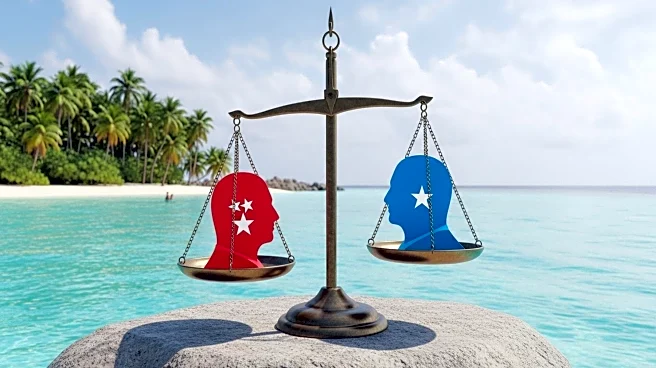What is the story about?
What's Happening?
The Seychelles is holding a runoff election between President Wavel Ramkalawan and opposition challenger Patrick Herminie. The initial election did not produce a clear winner, with Herminie receiving 48.8% of the vote and Ramkalawan 46.4%. A candidate must secure more than 50% of the vote to win. Early voting began on Thursday, with the majority of citizens casting their votes on Saturday. The results are expected on Sunday. The election is closely contested, with both candidates addressing key issues such as environmental damage and a drug addiction crisis. Herminie represents the United Seychelles party, which ruled the country from 1977 to 2020, while Ramkalawan is seeking a second term with the Linyon Demokratik Seselwa party.
Why It's Important?
The outcome of the Seychelles presidential runoff election is significant for the country's political landscape and its approach to pressing issues. The election could determine the future direction of policies related to environmental conservation and drug addiction, both critical challenges for the nation. The United Seychelles party, if successful, may shift the political dynamics, having previously governed for decades. The election also highlights the growing opposition to the current government, particularly concerning foreign investments and sovereignty issues, as seen in the controversy over the lease of Assomption Island to a Qatari company.
What's Next?
The results of the runoff election will be announced on Sunday, potentially leading to changes in government policy depending on the winner. If Herminie wins, there may be a shift in focus towards addressing the criticisms of foreign influence and prioritizing local welfare. Ramkalawan's victory could mean continuity in current policies, but with increased pressure to address environmental and addiction issues. The election's outcome will likely influence Seychelles' international relations and its approach to sustainable development.
Beyond the Headlines
The election underscores the broader implications of governance in small island nations facing global challenges like climate change and drug trafficking. The controversy over land leases to foreign entities raises questions about balancing economic development with national sovereignty. The high rate of heroin addiction highlights the need for comprehensive social policies to address public health crises. These issues reflect the complex interplay between local governance and global pressures.















